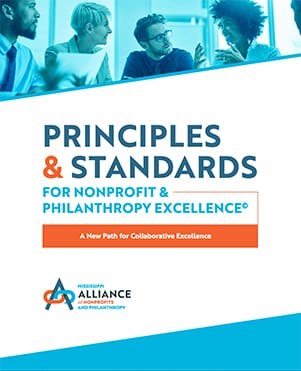Principles & Standards
For Nonprofit & Philanthropy Excellence
The 12 Accountability Principles
12. Volunteer Management
About
Volunteer Engagement
1. Nonprofits should assess the capacity of their organization to engage, supervise and support volunteers with the necessary level of attention, priority and resources before recruiting volunteers. FS
2. Nonprofits should put risk management procedures in place to assess, manage or lessen potential risks to volunteers, the organization and its clients, members and participants that may result from the delivery of a volunteer-led program or service. This should include obtaining adequate levels of insurance for volunteers and the use of liability waivers where appropriate. FS
Recruitment & Screening
3. Before recruiting volunteers, organizations should develop a clear description of the scope of the work, necessary skills, expected time commitment and the impact and benefits of the volunteer’s service. FS
4. Nonprofit organizations must conduct background checks if the volunteer will be working directly with vulnerable people. MS
5. Volunteer recruitment should incorporate a broad range of internal and external strategies to reach out to diverse sources of volunteers.
Engagement & Supervision
6. Volunteers should be provided with an orientation appropriate to their role. Orientation programs should include a clear written position description, a manual addressing relevant organization policies, information on disciplinary practices and other essential organization or position-related information.
7. Nonprofits should structure their volunteer program so that each volunteer has a direct connection with an identified supervisor and receives a level of support and supervision appropriate for their role.
8. Volunteers should receive ongoing performance-related feedback and a formal performance evaluation at a level appropriate to their involvement in the organization. They also should have the opportunity to provide feedback to the organization.
9. Nonprofits should provide formal and informal opportunities to recognize the impact and value of volunteers in advancing the organization’s mission.
10. The volunteer program should be evaluated periodically to assess the impact of the program, as well as the cost and benefits involved in recruiting, engaging and supervising volunteers.

